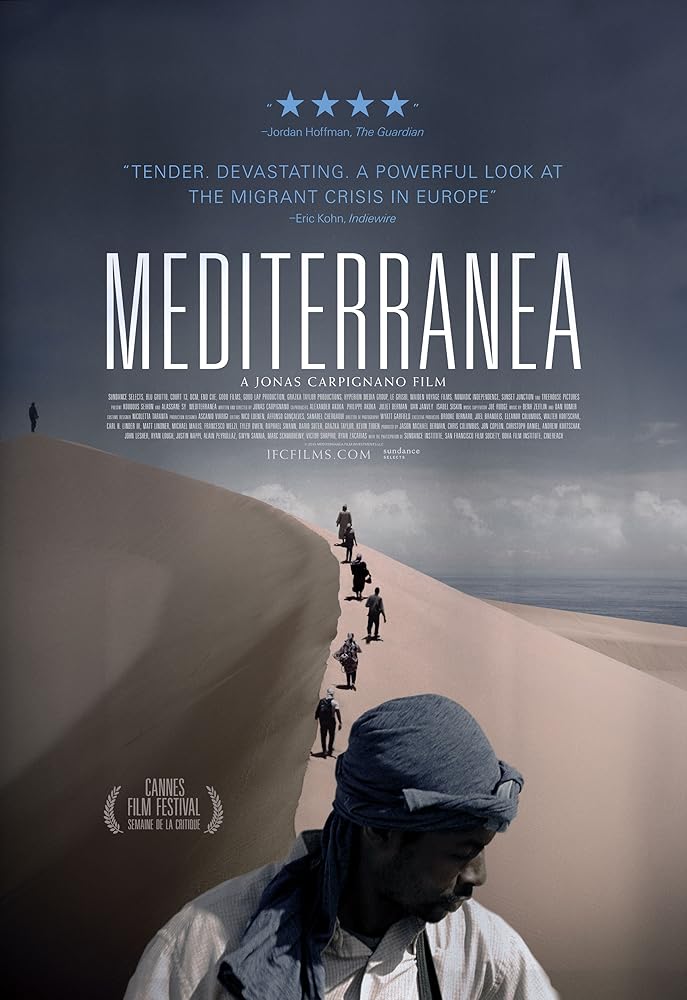
MEDITERRANEA
(director/writer: Jonas Carpignano; cinematographer: Wyatt Garfield; editors: Affonso Gonçalves /Nico Leunen/ Sanabel Cherqaoui; music: Ben Zeitlin/Dan Romer; cast: Koudous Seihon (Ayiva), Alassane Sy (Abas), Ousman Yabre (Ousman), Davide Schipilliti (Rocco), Vincenzina Siciliano (Marta), Mary Elizabeth Innocence (Mary), Pio Amato (Pio), Zaccaria Kbiri (Medhi); Runtime: 111; MPAA Rating: NR; producers: Jason Michael Berman, Chris Columbus, Jon Coplon, Christoph Daniel, Andrew Kortschak, John Lesher, Ryan Lough, Justin Nappi, Alain Peyrollaz, Gwyn Sannia, Marc Schmidheiny, Victor Shapiro, Raphael Swann, Ryan Zacarias; Audax Film; 2015-(Italy-France-U.S.-Germany-Qatar-in French, Italian, English, Arabic and Bissa, with English subtitles)
“A timely humanistic immigration film.”
Reviewed by Dennis Schwartz
A timely humanistic immigration film, based on a true story. The migrant tale focuses on two friends, Ayiva (Koudous Seihon) and Abas (Alassane Sy). Ayiva is the more serious, he has a wife and a young daughter, and just wants a job to support his family. Abas is more playful and excited about meeting the white European women, and doesn’t focus enough on how he will live in exile. With a band of others, they leave the economically stifled Burkina Faso in West Africa and must cross the harsh Sahara Desert and the Mediterranean Sea. In the sea voyage they must overcome storms and Arab bandits. When landing in their desired exile spot, the Calabrian town of Rosarno, after a trying journey, they are saddened when they are met with a chilly reception, harsh living conditions and a life so radically different from the one they left behind in their landlocked country. Ayiva gets work as a fruit picker, and although cheated in his wages he adjusts and begins to settle in by trying hard to make things work with his boss (Davide Schipilliti). Abas takes a different path, while he deeply resents how poorly he’s treated.
For this harrowing immigration tale, the privileged Wesleyan educated writer-director Jonas Carpignano, who was raised in Rome and New York, expands his 2012 short film “A Chjàna,” to make his feature film debut. The young Jonas shows his sympathies for the migrants. But even though he shows how much the immigrants are not wanted, he fails to tell of the 2010 race riots in Rosarno, the same place in Italy where this film is set. The riots showed how much they really weren’t wanted. That ugly incident alone resulted in 1,000 immigrants kicked out of Italy.
The episodic film resonates with some drama. It also rips off its subject matter from today’s headlines. The well-intentioned film, artfully shot, offers nothing new but an intense look at the hardships of being a black migrant in a white country. It leaves us with little hope for the future of the migrants and gives the impression that the migrants have become invisible figures, living a life in limbo in a foreign land where they are not wanted. I’m sure many other such immigrant films will soon follow.
REVIEWED ON 2/28/2016 GRADE: B-